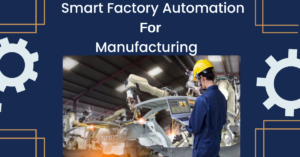Smart factory automation for manufacturing is highly digitized and connected environments where machinery and equipment can improve processes through automation and self-optimization. Factories of the future will be completely different than today’s, as they will be primarily automated and operated by machines. Smart factories are the future of manufacturing, as they offer many benefits, such as increased efficiency, improved quality, and reduced costs.

SMART FACTORY AUTOMATION FOR MANUFACTURING
What is a Smart Factory Automation?
Intelligent factory automation for manufacturing is a state-of-the-art technology that enables companies to automate their production processes. and it allows factories to operate more efficiently and produce higher-quality products.
How Does Smart Factory Automation work?
Intelligent factory automation uses sensors and advanced data analytics to monitor the production process in real time. Using This information to adjust accordingly and ensure that the factory runs smoothly will produce consistent results.
The Benefits of Smart Factory Automation:
There are many benefits of using intelligent factory automation for manufacturing. Some of the key benefits include:
- Better teamwork and information exchange: Smart manufacturing raises productivity and engagement by facilitating staff communication and skill development.
- Better data insights: better resource management and improved operational unit performance gives us visible results. You receive more information faster. Better problem-solving, increased productivity, and higher uptime are all benefits of real-time reporting.
- Monitoring products along the value chain: Additionally, processing and packaging have become computerized. From raw supplies through manufacturing to delivery, monitoring and examining every aspect of manufacturing. More efficiency, reduced waste, and the capacity to intervene tactically and precisely are all benefits of tracking these variables and making the company run successfully.
- Improved quality control and safety: Since intelligent manufacturing systems automatically collect data, you may use data to improve quality and safety. The system allows for the customization of automatic reporting structures and the integration of quality control procedures. Data analytics can enhance actions, such as staff training and establishing quick feedback loops.
- Increased efficiency and productivity: Smart factory automation can help to improve the efficiency of manufacturing processes, as well as the overall productivity of the business.
- Reduce human error: Utilizing digital technologies that enhance operational processes, you can ensure food safety and quality. Using more straightforward machine instructions, inline quality checks, and real-time monitoring can almost eliminate human errors.
- More excellent Product Quality: By automating the production process, factories can ensure that all products meet high-quality standards.
- Reduced Waste: With better monitoring of the production process, factories can identify and correct any problems early on, which reduces waste and improves productivity.
- Reduced Costs: Advanced technology allows factories to operate with fewer employees, which results in lower labor costs. In addition, machines can often perform tasks that are currently done by humans, further lowering production costs.
- Greater flexibility: Smart factory automation can also help increase manufacturing processes’ flexibility, allowing businesses to change and adapt their strategies as needed quickly.
The Need for Smart Factory Automation for Manufacturing
- The traditional manufacturing process is becoming increasingly outdated, as factories are struggling to keep up with the fast-paced and ever-changing landscape of the business world.
- To stay competitive, factories must improve efficiency and productivity while reducing costs. Intelligent factory automation offers a solution to these challenges, allowing factories to operate more efficiently and flexibly.
The Demerit of Smart Factory Automation
- The high investment cost: One of the biggest challenges associated with intelligent factory automation is the high acquisition cost. Businesses must ensure they have the financial resources to increase upfront costs.
CONCLUSION
- Intelligent factory automation for manufacturing is state-of-the-art technology that enables companies to automate their production processes. Factories of the future will primarily be automated and operated by machines.
- Smart factories offer many benefits, such as increased efficiency, improved quality, and reduced costs. Intelligent factory automation can enhance the efficiency of manufacturing processes. By automating the production process, factories can ensure that all products meet high-quality standards.
- Advanced technology allows factories to operate with fewer employees, which results in lower labor costs.
- The traditional manufacturing process is becoming increasingly outdated, and factories are struggling to keep up with the fast-paced and ever-changing landscape of the business world.
- Intelligent factory automation offers a solution to these challenges, allowing factories to operate more efficiently and flexibly.
- It can also increase manufacturing processes’ flexibility, allowing businesses to change and adapt their strategies quickly.
Around the clock virtual technical assistance is a cherry on the cake. We’re always at your assistance a phone call away, helping you troubleshoot any challenges.
Head over to our website www.amsantechnology.com or just call 91-9900601788, this is your cue.
We’re waiting to collab with you!





